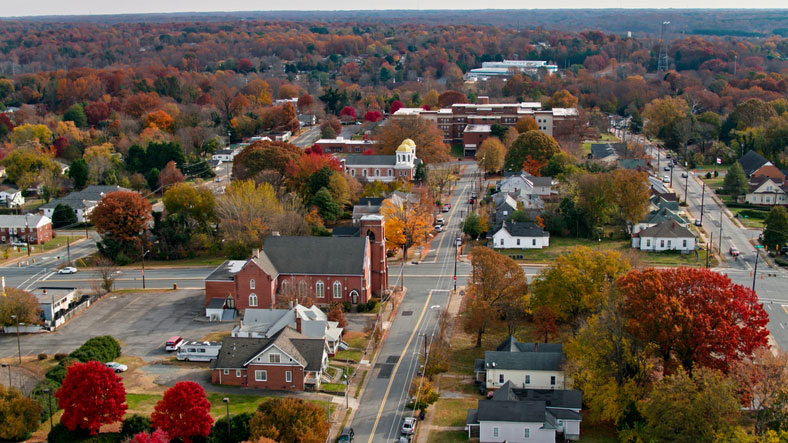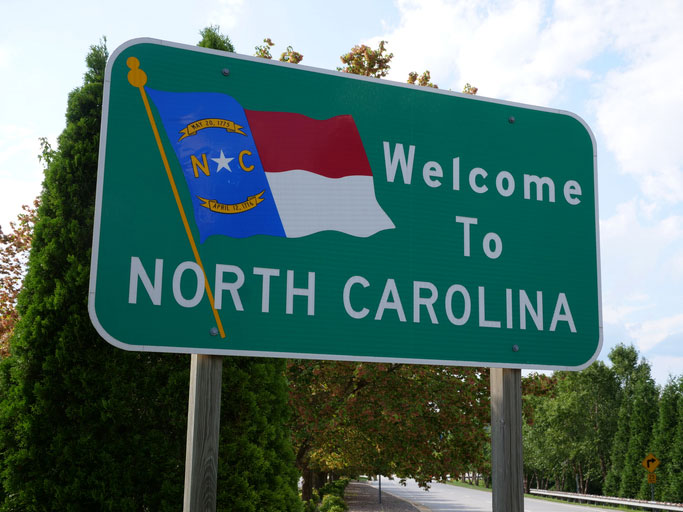Written by Helen Lewis

A vibrant city with a population of around 250,000 people, Winston-Salem, North Carolina offers a rich blend of history and modern culture. Home to the renowned Wake Forest University and within driving distance of the University of North Carolina at Greensboro (UNCG), Winston-Salem is a great place for aspiring social workers to develop experience and pursue their dream careers.
The following article offers an overview of the various job prospects, salary expectations, and educational pathways available to aspiring social workers in Winston-Salem, NC.
We’ll also dive into the benefits of earning an MSW, including the potential for higher salaries and specialized roles, as well as breaking down key questions like:
- What kinds of jobs can a social worker do?
- Do I need an MSW to become a social worker?
- What are social work master’s programs near me?
- Do I need a professional license to become a social worker in Winston-Salem?
- What does accreditation mean?
Finally, you’ll be able to get a sense of the salary ranges for social workers in the Camel City based on up-to-date information from the Bureau of Labor Statistics.
Social Work in the City of Winston-Salem, NC
Winston-Salem, North Carolina is home to around 251,350 people. According to the United States Census Bureau, the racial and ethnic composition of the city is quite varied: approximately 51% of residents identify as White, 33.2% as Black or African American, 16.6% as Hispanic or Latino, 2.5% as Asian, 0.3% as American Indian, and 7.4% as two or more races.
The city’s immigrant population is about 10.4%, reflecting its welcoming nature for people from around the world. Unfortunately, Winston-Salem faces significant challenges with poverty and homelessness, with 18.3% of residents living below the poverty line, which is above the national average. The median household income is $54,195.
Careers in Social Work: What Kinds of Jobs Can A Social Worker in Winston-Salem, NC Do?
As you’ll see in the chart at the end of this article (in the section “Social Worker Salaries in Winston-Salem”), social workers working in child, family, and school services; mental health and substance abuse; and in healthcare have lower salaries than social workers who are employed outside of those fields. But what does that mean?
One of the best things about social work is that it’s an incredibly diverse field, with a wide range of employment opportunities to fit many different kinds of skills.
Alternative forms of social work that could be considered under the umbrella of “Social Work (All Other)” could be things like:
- Administrative social work: Having a role as the executive director or program director/manager of a non-profit organization, for example, would utilize the skillset of a trained social worker, but with a higher earning potential due to the senior-level role.
- Policy advocacy: As a trained social worker and advocate, you could serve as an intermediary between disadvantaged communities in Winston-Salem and politicians at the local, state, or even federal levels. Having a background in social work would equip you with a strong set of academic, practical, and theoretical skills in things like psychology, sociology, network-building, and research methods, while your employment outside of traditional social work settings (i.e., government agencies; think tanks) could lead to a higher salary.
- Corporate Social Responsibility (CSR) specialist: In this context, a trained social worker would work with businesses to develop and implement socially responsible practices and community engagement strategies. An MSW degree could help aspiring CSR specialists establish networks and build connections within underserved communities, acting as a spokesperson for their needs to workers at the corporate level.
- Human Resources (HR) specialist: Powered by knowledge from MSW programs about conflict resolution, psychology, and cultural competence, trained social workers could be strong HR specialists by bringing their skills to focus on employee well-being, diversity and inclusion programs, and organizational development within companies.
- Researcher/Evaluator: Social workers can also find roles conducting research and program evaluations for universities, research institutions, or consulting firms, focusing on social issues and interventions.
- Training and Development Specialist: Using their years of research and experience, social workers with MSW degrees are uniquely qualified to design and implement training programs for organizations, focusing on topics like diversity, equity, and inclusion.
MSWs: Social Work Degrees in Winston-Salem, NC

Winston-Salem is home to excellent educational institutions, including Wake Forest University. However, Wake Forest does not have an official Bachelor’s or Master’s in Social Work (BSW or MSW) program. That means that if you are looking to pursue a BSW or MSW without leaving Winston-Salem, North Carolina, your best bet will be to assess hybrid and online options.
The University of North Carolina at Greensboro (UNCG) offers a well-regarded MSW program with hybrid and exclusively in-person options, which are both easily accessible for Winston-Salem residents. For those who are exclusively based in Winston-Salem, UNCG’s hybrid courses blend in-person and online learning, making it convenient for students who need flexibility.
If you’re a prospective student with financial, familial, or other limitations that mean in-person learning of any kind is not an option, there are fully online MSW programs offered by several universities across North Carolina and beyond, providing the same rigorous education with the convenience of studying from home. Some of the top-rated programs in the country are:
- Columbia University: Known for its prestigious School of Social Work, Columbia offers an online MSW that features six different pathways, including a two-year option, an advanced standing program, and part-time to full-time options. The program emphasizes a strong foundation in social justice, research, and clinical practice, making it a great choice for those looking to make a significant impact in the field.
- University of Southern California (USC): USC's online MSW program is highly regarded and offers several specializations such as adult mental health and wellness, children, youth and families, and social change and innovation. The program is designed to provide a rigorous and comprehensive education, equipping graduates with the skills needed for various social work careers.
- University of Denver: The University of Denver's Graduate School of Social Work offers an online MSW program that can be completed in as few as 18 months for students with a Bachelor of Social Work (BSW) degree. The program includes concentrations in mental health and trauma, and health, equity, and wellness, providing a robust education tailored to current social work needs.
- Arizona State University (ASU): ASU offers a fully asynchronous online MSW program that allows students to interact with professors and peers via Zoom. The program features specializations in health and behavioral health, public child welfare, and children, youth, and families, ensuring a comprehensive education that prepares students for licensure and advanced practice.
If you’re able to commute, UNCG is just 29 miles away from Winston-Salem, meaning a driving time of around half an hour. This program, which is also available to attend 100% in person, provides a comprehensive curriculum designed to prepare students for advanced social work practice in various settings. Another nearby option is the MSW program at North Carolina A&T State University, also located in Greensboro, which emphasizes social justice and community empowerment.
Worried about needing a bachelor’s degree in social work to apply? Most MSW programs, including those at UNCG and North Carolina A&T, welcome applicants with undergraduate degrees in various fields. While having a background in social work or related disciplines can be beneficial, it is not a strict requirement, opening doors for a diverse range of applicants passionate about making a difference in the community.
Choosing a Grad School for Social Work: What Is Accreditation?
Accreditation is a rigorous process where an independent accrediting body evaluates a school’s educational quality, curriculum, faculty qualifications, and student services to ensure they meet established standards. For MSW programs, the key accrediting body is the Council on Social Work Education (CSWE). When a program is accredited, it means it has been vetted for excellence and rigor, ensuring that students receive an education that meets the professional standards required for social work practice.
Choosing an accredited university is crucial for several reasons. Firstly, it assures that the education you receive is of high quality and is recognized nationally, which is essential for licensure and employment. Employers often prefer or even require degrees from accredited programs, knowing that graduates have been properly trained.
Additionally, attending an accredited program can provide access to federal financial aid, scholarships, and various student services that may not be available otherwise.

Do I Need An MSW To Become A Social Worker?
While a Master’s in Social Work (MSW) isn’t always required, many organizations prefer candidates with education and experience in social work. In addition to having a leg up in your job search, an MSW equips you with thousands of hours of research and hands-on experience that is sure to be useful down the line. Having an advanced degree is also a strong way to advocate for a higher salary, compared to applicants that do not have master’s degrees.
Do I Need A License to Become A Social Worker?
Getting a license in social work depends on what kind of social work you want to do and where you’re planning to work. If you’re looking to get into entry-level positions, like working as a case manager or a social services assistant, you likely don’t need a license, but could pursue additional credentials if you’d like to have them.
One instance in which an MSW is necessary is in becoming a social worker in clinical settings like hospitals, rehabilitation clinics, and mental health facilities, which often requires becoming a Licensed Clinical Social Worker (LCSW).
Clinical social work is a specialized field focusing on diagnosing and treating mental health issues, emotional problems, and behavioral disorders. In this context, clinical social workers are equipped to provide therapeutic services, such as individual and group therapy, and develop treatment plans to help clients manage and overcome their challenges. Clinical social workers can work in various settings, including hospitals, mental health clinics, private practices, schools, and non-profit organizations. You cannot become an LCSW without an MSW.
Even for non-clinical roles, having a license can be a big plus. It can open up more job opportunities, potentially lead to higher salaries, and generally boost your credibility as a professional. Different states have different requirements, so it’s a good idea to check the specific licensing rules in the state where you want to work. In North Carolina, for example, you need to go through the North Carolina Social Work Certification and Licensure Board to get your license.
Rules for licensure as a social worker vary from state to state. In order to ensure that you are pursuing licensure using the most current information, please visit the website of the North Carolina Social Work Certification and Licensure Board.
Social Work Internships in Winston-Salem
An MSW internship typically involves hands-on experience in a professional social work setting, and the structure often differs between the first and second year. During the first year, internships are usually more generalist in nature, focusing on building foundational skills in areas like client assessment, case management, and basic intervention strategies. These placements might be in settings like community centers, schools, or healthcare facilities. In the second year, internships become more specialized and are often aligned with the student’s chosen concentration, such as clinical social work, community practice, or policy advocacy. These advanced placements require students to take on more complex cases and responsibilities, providing deeper immersion into their field of interest and preparing them for professional practice after graduation.
Finding a social work internship in Winston-Salem as part of an MSW program can be an exciting, if challenging, process. Start by consulting your university’s career services or internship placement office, as they often have established relationships with local agencies and can help match you with an appropriate placement. Networking with professors and attending local social work events or job fairs can also provide valuable leads. Additionally, you can reach out directly to local organizations such as hospitals, non-profits, schools, and government agencies that offer social services to inquire about internship opportunities. Websites like Idealist.org and social work-specific job boards can also be useful resources for finding internships.
Social Worker Salaries in Winston-Salem
According to the Bureau of Labor Statistics, there is a wide range in salaries for social workers, with employees in this field earning anywhere from $32,730 to $97,280 annually nationwide.
The table below offers a glimpse into the range of salaries—from the bottom 10% of earners to the top 10% of earners—available to social workers in Winston-Salem across four categories. The final category, “Social Workers (All Other),” is broad enough that it may include such diverse positions as community organizers, homeless shelter workers, corrections social workers, grant writers, and crisis hotline counselors. As you’ll see in the below chart, employment as a social worker outside of child, family, and school; healthcare; or mental health and substance abuse services has the highest earning potential for social workers in Winston-Salem. For more on potential jobs outside of those fields, see the above section “Careers in Social Work: What Kinds of Jobs Can a Social Worker in Winston-Salem, NC Do?”.
Social Work Specialty | 10% | 25% | 50% (Median) | 75% | 90% |
Child, Family, and School Social Workers | $39,680 | $44,950 | $50,530 | $57,050 | $63,160 |
Healthcare Social Workers | $47,720 | $53,820 | $65,060 | $78,160 | $79,570 |
Mental Health and Substance Abuse Social Workers | $35,150 | $46,160 | $54,870 | $54,870 | $54,870 |
Social Workers (All Other) | $43,740 | $48,140 | $69,100 | $97,090 | $105,190 |
Table data taken from 2023 BLS reports for the Winston-Salem metropolitan area.
2023 US Bureau of Labor Statistics job market trends and salary figures for child, family, and school social workers, healthcare social workers, mental health and substance abuse social workers, and social workers (all other) are based on national data, not school-specific information. Conditions in your area may vary. Data accessed June 2024.







